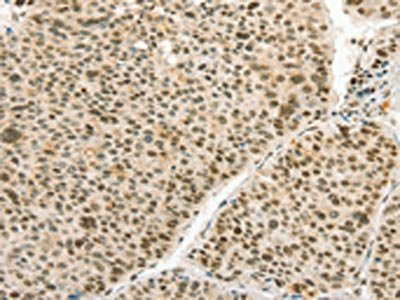ANGPT4 Antibody
-
中文名稱:ANGPT4兔多克隆抗體
-
貨號:CSB-PA584378
-
規(guī)格:¥1100
-
圖片:
-
The image on the left is immunohistochemistry of paraffin-embedded Human liver cancer tissue using CSB-PA584378(ANGPT4 Antibody) at dilution 1/70, on the right is treated with synthetic peptide. (Original magnification: ×200)
-
The image on the left is immunohistochemistry of paraffin-embedded Human colon cancer tissue using CSB-PA584378(ANGPT4 Antibody) at dilution 1/70, on the right is treated with synthetic peptide. (Original magnification: ×200)
-
Gel: 8%SDS-PAGE, Lysate: 40 μg, Lane 1-2: Human right lung tissue, Human left lung cancer tissue, Primary antibody: CSB-PA584378(ANGPT4 Antibody) at dilution 1/480, Secondary antibody: Goat anti rabbit IgG at 1/8000 dilution, Exposure time: 2 minutes
-
-
其他:
產(chǎn)品詳情
-
Uniprot No.:
-
基因名:
-
別名:AGP4 antibody; ANG-3 antibody; ANG-4 antibody; ANG3 antibody; ANG4 antibody; Angiopoietin 3 antibody; Angiopoietin 4 antibody; Angiopoietin-3 antibody; Angiopoietin-4 antibody; ANGP4_HUMAN antibody; ANGPT4 antibody; dJ824F16.2 (angiopoietin 4) antibody; MGC138181 antibody; MGC138183 antibody; OTTHUMP00000029947 antibody
-
宿主:Rabbit
-
反應(yīng)種屬:Human
-
免疫原:Synthetic peptide of Human ANGPT4
-
免疫原種屬:Homo sapiens (Human)
-
標(biāo)記方式:Non-conjugated
-
抗體亞型:IgG
-
純化方式:Antigen affinity purification
-
濃度:It differs from different batches. Please contact us to confirm it.
-
保存緩沖液:-20°C, pH7.4 PBS, 0.05% NaN3, 40% Glycerol
-
產(chǎn)品提供形式:Liquid
-
應(yīng)用范圍:ELISA,WB,IHC
-
推薦稀釋比:
Application Recommended Dilution ELISA 1:2000-1:10000 WB 1:200-1:1000 IHC 1:100-1:300 -
Protocols:
-
儲存條件:Upon receipt, store at -20°C or -80°C. Avoid repeated freeze.
-
貨期:Basically, we can dispatch the products out in 1-3 working days after receiving your orders. Delivery time maybe differs from different purchasing way or location, please kindly consult your local distributors for specific delivery time.
相關(guān)產(chǎn)品
靶點(diǎn)詳情
-
功能:Binds to TEK/TIE2, modulating ANGPT1 signaling. Can induce tyrosine phosphorylation of TEK/TIE2. Promotes endothelial cell survival, migration and angiogenesis.
-
基因功能參考文獻(xiàn):
- Ang-4 also promoted survival of LECs. Thus, blocking Ang-4 may prune the draining lymphatic vasculature and decrease interstitial fluid pressure (IFP) by reducing vascular permeability. PMID: 25977256
- acute-phase protein A1AT is a physiological regulator of angptl4, another acute-phase protein. PMID: 24760148
- Angptl4 is a glucocorticoid-responsive mediator of fasting-induced intracellular lipolysis and stimulates cAMP signaling in adipocytes PMID: 22267746
- In tumor cells, only Ang-4 expression has prognostic impact in NSCLC. In NSCLC tumor stroma, Ang-4 and Ang-2 are independently associated with survival. PMID: 21603628
- Linkage to 20p13 including the ANGPT4 gene in families with mixed Alzheimer disease and vascular dementia is reported. PMID: 20596041
- Results establish the novel effects of Ang-4 on tumor angiogenesis and GBM progression and suggest that this pro-GBM effect of Ang-4 is mediated by promoting tumor angiogenesis and activating Erk1/2 kinase in GBM cells. PMID: 20823154
- the angiopoietin/Tie-2 system may participate in the angiogenic response to hypoxia in renal tissues and in tumor angiogenesis in renal carcinoma. PMID: 15198927
- Recombinant Ang4 formed disulfide-linked dimers. Ang4 produces corneal angiogenesis extending from the limbus across the mouse cornea in vivo. Ang4 is an agonist of Tie2. PMID: 15284220
- angiopoietin-4 inhibits angiogenesis and reduces interstitial fluid pressure PMID: 16790085
- Results describe the expression of angiopoietin-1, 2 and 4 and Tie-1 and 2 in gastrointestinal stromal tumors, leiomyomas and schwannomas. PMID: 17724803
顯示更多
收起更多
-
亞細(xì)胞定位:Secreted.
-
組織特異性:Highly expressed in the lung with much lower levels found in other tissues.
-
數(shù)據(jù)庫鏈接:
Most popular with customers
-
-
YWHAB Recombinant Monoclonal Antibody
Applications: ELISA, WB, IF, FC
Species Reactivity: Human, Mouse, Rat
-
Phospho-YAP1 (S127) Recombinant Monoclonal Antibody
Applications: ELISA, WB, IHC
Species Reactivity: Human
-
-
-
-
-























